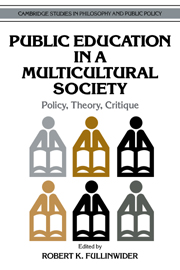Book contents
- Frontmatter
- Contents
- Contributors
- Preface
- PART I INTRODUCTION AND CRITIQUE
- PART II CULTURE AND IDENTITY
- PART III RELATIVISM, REASON, AND PUBLIC EDUCATION
- PART IV TEACHING HISTORY
- PART V TEACHING LITERATURE
- 10 Multicultural literature and civic education: a problematic relationship with possibilities
- 11 Teaching American literary history
- Index
10 - Multicultural literature and civic education: a problematic relationship with possibilities
Published online by Cambridge University Press: 05 June 2012
- Frontmatter
- Contents
- Contributors
- Preface
- PART I INTRODUCTION AND CRITIQUE
- PART II CULTURE AND IDENTITY
- PART III RELATIVISM, REASON, AND PUBLIC EDUCATION
- PART IV TEACHING HISTORY
- PART V TEACHING LITERATURE
- 10 Multicultural literature and civic education: a problematic relationship with possibilities
- 11 Teaching American literary history
- Index
Summary
Recent discussions of multiculturalism and public education have focused primarily on the question of how our national history ought to be represented, and on whether different perspectives on that history can be integrated within a curriculum that fosters a common civic identity. In contrast, little critical attention has been paid, from the standpoint of civic education, to the influence of multiculturalism on the K–12 literature arts curriculum. To judge from articles in professional journals in education, presentations at professional conferences, and formal and informal surveys of current classroom textbooks, multiculturalism has inspired profound changes in the selection of literature for classroom study and in teaching strategies adopted for literature instruction. But the relation between these changes and the project of civic education remains virtually unexplored.
In some respects, the prevailing emphasis on the history/social studies curriculum is not surprising. Since the early decades of the twentieth century, civic education has been the official responsibility only of history and social studies teachers. Moreover, it is difficult to find English educators or literary critics who have seriously explored the role that a K-12 literature curriculum plays, or should play, in the formation of a specifically American identity and in the development of the attitudes and values needed for a form of self-government based on the primacy of individual rights and individual responsibilities.
- Type
- Chapter
- Information
- Public Education in a Multicultural SocietyPolicy, Theory, Critique, pp. 231 - 264Publisher: Cambridge University PressPrint publication year: 1996
- 2
- Cited by



